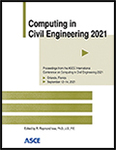Proactive Smart Home Assistants for Automation—User Characteristic-Based Preference Prediction with Machine Learning Techniques
Publication: Computing in Civil Engineering 2021
ABSTRACT
AI-powered smart homes bring high-quality intelligent services to occupants with digital virtual assistants. Through interactions with occupants, the smart home assistants (SHAs) can develop occupants’ profiles using a number of personal characteristic features for tailored and smart interactions. Based on these profiles, smart home systems can proactively offer automation services while conserving occupants’ comfort and convenience. In this study, we have sought to investigate characteristic features that affect occupants’ perception of the proactive concept, as well as their preferences for modes of interactions through an application of automation for energy efficiency management. Upon a data collection through an online experiment on campus, 58 valid responses with personal characteristic features were utilized to develop predictive machine learning models. These models can predict participants’ general attitude towards proactive SHAs, as well as their preferences for interaction modes with good performance (accuracy between 0.67 and 0.82 and F-score between 0.66 and 0.74). Various features were identified to have considerable significance, including personal beliefs of taking actions and energy expenses, as well as environmental protection values. The findings of this study provide an insight into the design of learning processes for virtual assistants in smart home ecosystems and the effect of the individual characteristics on the users’ preferences for interactions with SHAs.
Get full access to this article
View all available purchase options and get full access to this chapter.
REFERENCES
Afzalan, M., and Jazizadeh, F. (2018). “Efficient integration of smart appliances for demand response programs,” Proc. of the 5th Conference on Systems for Built Environments (BuildSys `18). ACM, New York, NY, USA, 2018.
Alaa, M., Zaidan, A. A., Zaidan, B. B., Talal, M., and Kiah, M. L. M. (2017). “A review of smart home applications based on Internet of Things.” Journal of Network and Computer Applications, 97, 48–65.
Chua, K. J., Chou, S. K., Yang, W., and Yan, J. (2013). “Achieving better energy-efficient air conditioning–a review of technologies and strategies.” Applied Energy, 104, 87–104.
Ding, Z., Wang, G., Liu, Z., and Long, R. (2017). “Research on differences in the factors influencing the energy-saving behavior of urban and rural residents in China–A case study of Jiangsu Province.” Energy Policy, 100, 252–259.
Georgiev, A., and Schlögl, S. (2018). “Smart home technology: An exploration of end user perceptions.” Innovative Lösungen für eine alternde Gesellschaft: Konferenzbeiträge der SMARTER LIVES, 18(20.02).
Heydarian, A., McIlvennie, C., Arpan, L., Yousefi, S., Syndicus, M., Schweiker, M., Jazizadeh, F., Rissetto, R., Pisello, A. L., and Piselli, C. (2020). “What drives our behaviors in buildings? A review on occupant interactions with building systems from the lens of behavioral theories.” Building and Environment, 106928.
Jivani, F. D., Malvankar, M., and Shankarmani, R. “A Voice Controlled Smart Home Solution With a Centralized Management Framework Implemented Using AI and NLP.” Proc., 2018 International Conference on Current Trends towards Converging Technologies (ICCTCT), IEEE, 1–5.
Jung, W., and Jazizadeh, F. (2020). “Energy saving potentials of integrating personal thermal comfort models for control of building systems: Comprehensive quantification through combinatorial consideration of influential parameters.” Applied Energy, 268, 114882.
Mennicken, S., Zihler, O., Juldaschewa, F., Molnar, V., Aggeler, D., and Huang, E. M. “” It’s like living with a friendly stranger” perceptions of personality traits in a smart home.” Proc., Proceedings of the 2016 ACM International Joint Conference on Pervasive and Ubiquitous Computing, 120–131.
Miksik, O., Munasinghe, I., Asensio-Cubero, J., Bethi, S. R., Huang, S., Zylfo, S., Liu, X., Nica, T., Mitrocsak, A., and Mezza, S. (2020). “Building proactive voice assistants: When and how (not) to interact.”.
Sciuto, A., Saini, A., Forlizzi, J., and Hong, J. I. “” Hey Alexa, What’s Up?” A Mixed-Methods Studies of In-Home Conversational Agent Usage.” Proc., Proceedings of the 2018 Designing Interactive Systems Conference, 857–868.
Singh, D., Psychoula, I., Kropf, J., Hanke, S., and Holzinger, A. “Users’ perceptions and attitudes towards smart home technologies.” Proc., International Conference on Smart Homes and Health Telematics, Springer, 203–214.
Tabassum, M., Kosinski, T., and Lipford, H. R. “” I don’t own the data”: End User Perceptions of Smart Home Device Data Practices and Risks.” Proc., Fifteenth Symposium on Usable Privacy and Security ({SOUPS} 2019).
Information & Authors
Information
Published In
History
Published online: May 24, 2022
Authors
Metrics & Citations
Metrics
Citations
Download citation
If you have the appropriate software installed, you can download article citation data to the citation manager of your choice. Simply select your manager software from the list below and click Download.
